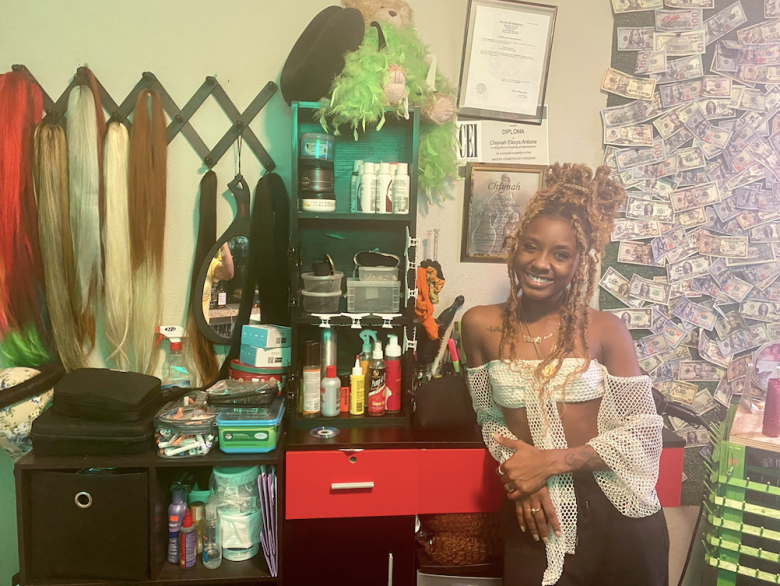
As a little girl the smells of hairspray, deep conditioner and hot flat irons filling the air were part of a weekend routine. The hair salon was more than a place to get your hair done, it was a way to connect to your community, get the hottest gossip and everything else in between. Today, that community has seemed to dissipate and shift into more stylists and beauticians going solo, redefining what we knew as Black hair culture.
In the 90’s and early 2000’s, Black-owned hair culture was a huge staple in the Black community; it was the first nudge at Black-owned businesses and ownership. We had a place that was for us, by us and we used it to uplift and support each other in many ways.
Atlanta, specifically, has always been known as one of the world-renowned Black hair capitals. With the Freaknik aesthetic trends taking off, the Bronner Bros. annual hair shows that are hosted downtown and the longevity of local Black-owned salons, Atlanta’s Black hair community has always had a strong, positive presence. Today, the number of brick and mortar Black-owned hair salons have dwindled and beauticians are going the entrepreneurial route for many reasons.
Like many other ventures, Black business owners typically receive less capital than their non-Black counterparts. According to a McKinsey & Co. report in 2020, Black business owners start with loans that are roughly $35,000 in contrast to the roughly $107,000 white business owners start with. The study also touches on the wage and representation disparity between Black and non-Black business owners. Those disparities result in lower revenues and earnings than white businesses, even with minor efforts from the SBA and the ongoing trend of outside business loans and assistance for Black female entrepreneurs. Due to these business trends and the ways of the hair and beauty industry, many beauticians explored different routes to still accomplishing their goals within their profession.
Aisha Amos is the owner and sole stylist of Hair Beat Salon in Atlanta’s Little Five Points neighborhood. She’s been a self-taught braider since the age of seven and a licensed beautician since 2014. Amos, a native of Baltimore, Maryland, currently rents a suite at Salon Lofts, a suite rental business for independent beauty professionals, and enjoys it more than the traditional salon setting.
“At the time, they were building a Salon Lofts by our cosmetology school,” said Amos, 46. “And for a field trip one night, our instructor took us over to look at them and I was like ‘yeah, I think I want to do something like this.’”
Amos’ thought process during that decision was rooted in her want to help people and the attitudes of her fellow associates in cosmetology school. She was lucky to find her friend and business associate, Traci Burton, owner of Crimson Beauty Salon in Edgewood, but Amos and Burton agreed that a significant portion of their peers didn’t take the profession as seriously.
“I can’t be in a shop,” says Amos. “I like it and you know, the comradery and being around other stylists but I couldn’t see myself paying the same booth rent or the same amount of money and not having any control, it just wasn’t adding up.”
Salon Lofts gave Amos and Burton that flexibility to control their own schedule, balance their earnings and still build that community for themselves. Salon Lofts offer stylists their individual suite that they rent weekly and still have that traditional salon-like feeling looming through the halls. This is one of the biggest alternatives that stylists and beauticians have taken to become individual businesses.
With this shift into the rise of individual businesses come some obstacles. Today, “Atlanta stylists” and “Atlanta braiders” are trending topics on social media and not for the best reasons. The viral topic includes commentary from displeased customers about professionalism, pricing, rules and quality.
“There’s these stereotypes that come with the craft now that I’m trying to step away from,” said Chiynah Town, owner of CT Hair Hu$tle, LLC.
Town also believes that people are not looking beyond the stereotypes and come with preconceived notions that every stylist they come across is rude, late and expensive. One way that Town dispels those stereotypes is by letting her accredited work and bubbly personality do it for her. Although she’s doing business out of her home, she has everything else necessary to become the successful stylist she is and she’s still learning.
“They don’t teach you the business side of cosmetology so much,” said Town. “So trying to get into a salon is a lot harder than people think… it’s hard and competitive and you’re not making the money you’re supposed to be making.”
Stylists like Amos, Burton and Town are the ones spearheading this shift in Black hair culture and while it comes with many ups and downs, the reward of seeing your work flourish and still building that community makes it worthwhile. The shifts and changes we’re seeing aren’t all bad and continue to nod at the stylists and businesses that came before us and sculpted this culture.

